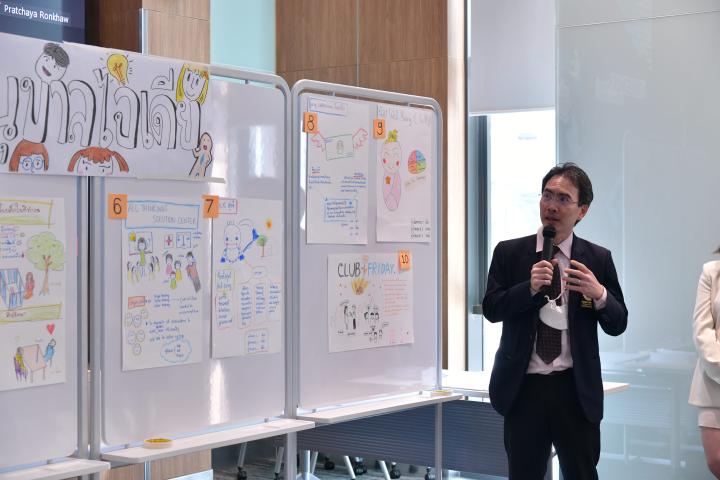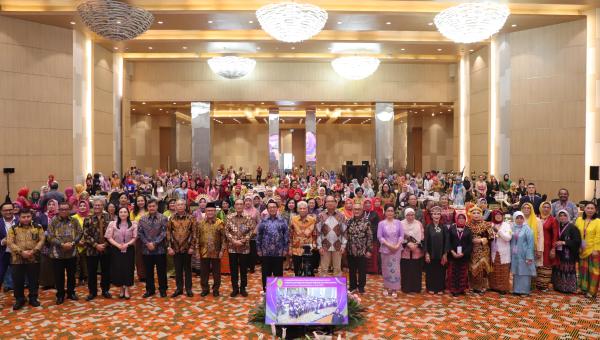Innovative Thinking for a Safe Space in the Justice System
Designing System for Ending Violence
April 8, 2024
The "Design System for Ending Violence" workshop, organized by the Nitivajra Institute, the Thailand Institute of Justice (TIJ), and the United Nations Development Program (UNDP), concluded its five-session journey in March 2024.
The event, supported by the U.S. Bureau of International Narcotics and Law Enforcement Affairs (INL) and part of the UNDP Judicial Integrity Network in ASEAN project, aimed to tackle violence in the justice system, particularly against vulnerable groups.
Held at the Thailand Institute of Justice, it employed System, Design, and Futures Thinking methodologies to encourage attendees to develop creative strategies, emphasizing inclusivity and stakeholders cooperation.
Participants were from various professions, including judges, prosecutors, police officers, personnel from relevant ministries, and individuals from the private sector, NGOs, academia, and the public.
The workshop's outcomes, which suggest a promising shift towards a fairer and more transparent justice system, hold the potential to catalyze broader societal change, inspiring a future where violence against vulnerable groups is no longer tolerated.

The Workshop
1st session:
The organizers introduced the concept of violence within the justice system along with methods such as Systems, Design, and Futures Thinking. Participants shared hopes for fairness and collaboration despite concerns about delays, abuse of power, and biases. They identified common issues, including gaps in practitioner knowledge and attitudes, and recognized systemic challenges.
2nd session:
Led by Associate Professor Dr. Borwornsom Leerapan and colleagues, participants utilized Systems Thinking to analyze violence in the justice system. They employed tools like Behavior Over Time Graphs and Causal Loop Diagrams to understand systemic dynamics. Groups selected indicators to measure violence and explored complex relationships between factors contributing to violence. By the end, they developed a systemic understanding, focusing on identifying causal relationships and setting aside unclear concerns for further exploration.
3rd session:
Under the guidance of by Ms May Sripatanaskul and the Lukkid team, participants delved into Design Thinking tailored to the needs of the justice system. Real-life perspectives from victims and suspects enriched discussion. Groups proposed diverse solutions, including private sector engagement and victim empowerment, emphasizing innovative, user-centered approaches to address systemic violence issues.
4th session:
Led by Ms Sommanat Juaseekoon and supported by the School of Public Policy at Chiang Mai University, participants delved into Futures Thinking. This involved envisioning future scenarios based on current data to anticipate potential outcomes regarding violence within the justice system. Additionally, they refined previously identified solutions by analyzing driving forces and obstacles to their implementation.
5th session:
The final session of the initiative was led by associate Professor Dr. Borwornsom Leerapan, Dr. Phanuwich Kaewkamjornchai, Dr. Natthawut Langtanarat. Participants gathered to reflect on what they had learned and the insights gained from previous sessions. They collaboratively defined strategies for future action, implemented new thinking systems, and identified areas for improvement or continuation in their efforts.
Following the sessions, participants developed innovative project proposals to address violence in the justice system. These proposals included incentivizing private sector support through tax benefits and suggesting the establishment of a comprehensive Physical and Mental Health Care System for practitioners to mitigate stress-related violence. These recommendations aim to enhance the justice system's capacity and improve practitioner well-being, ultimately contributing to a safer and more effective environment.
Insights from the project revealed that systematic thinking tools employed by facilitators led to shifts in participants' cognitive approaches, fostering deeper analysis of issues such as violence in the justice system.
A survey revealed that participants expressed high satisfaction with the activities, particularly noting Design Thinking as the most recognized tool. Impressions from the questionnaire highlighted effective learning opportunities and cross-sectoral collaboration. Additionally, participants reported benefits such as enhanced problem-solving skills through tools like Systems Thinking. Suggestions for future sessions included prioritizing continuity, increasing participant diversity, and expanding regional outreach efforts.
In the upcoming intended phase, training on innovative thinking tools for justice personnel is planned for mid-2024, seeking to bolster problem-solving capabilities within the justice system further.

 Locations
Locations





